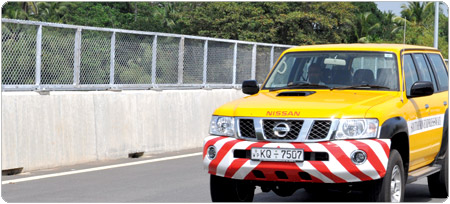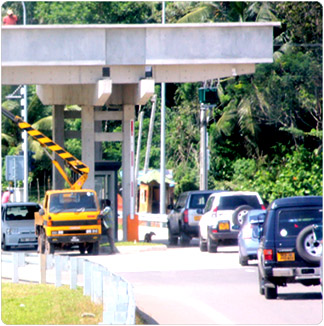Toll collection to maintain the Expressway

"The RDA is ever ready to take up future
challenges in building expressways in Sri Lanka, especially with the
experience of constructing the first ever E Grade road in the country,
the Southern Expressway, said the Chairman of the Road Development
Authority (RDA), R.W.R. Pemasiri. The country is now poised to go for
many more expressways."
The RDA is now in the process of constructing the Colombo -
Katunayake Expressway and Colombo Outer Circular Road. Apart from that
RDA is expecting to extend the Southern Expressway further upto Matara
by 2013 and then go upto Hambantota in the near future. Colombo-Kandy
Expressway is also in the agenda.
|
“We
trained our staff. We trained them how to make use of this road,
how to issue tickets, how to charge the fees. We are deploying
500 RDA staff for this and the Police will also deploy over 500
personnel for security and for monitoring vehicular traffic” |
"Therefore, we are moving towards a challenging situation with regard
to the road network in the country. Earlier we were maintaining other
roads. But for the expressway we have to pay our attention 24 hours a
day. For other roads we did not have to pay much attention. But for this
we had to commit ourselves round the clock", he said.
"We trained our staff. We trained them how to make use of this road,
how to issue tickets, how to charge the fees. We are deploying 500 RDA
staff for this and the Police will also deploy over 500 personnel for
the security and monitoring the vehicular traffic", he added.
Road safety has become the prime concern of the RDA as the country is
above to have the expressway experience but confident that Sri Lankan
drivers will adapt to this system very fast.
"This is the first time Sri Lankan drivers will use an expressway in
Sri Lanka. They are not trained for this properly. Therefore, they have
to adhere to lane discipline strictly. That will take little time for us
to show them. The majority of Sri Lankans are educated and intelligent
people. Many of our drivers were employed in other countries. Therefore,
I think they will pick up fast. Till then we have take it up as a
challenge", the RDA Chairman said.
 "Since
vehicles are expected to run at a high speed, the possibilities of
accidents are there. To face such situations we have established a
separate emergency service unit. We have a paramedical unit for the
Expressway and, the Police, the Special Task Force are handling this.
The Fire Fight unit is also there to face emergencies which is also
under the STF", he added. "Since
vehicles are expected to run at a high speed, the possibilities of
accidents are there. To face such situations we have established a
separate emergency service unit. We have a paramedical unit for the
Expressway and, the Police, the Special Task Force are handling this.
The Fire Fight unit is also there to face emergencies which is also
under the STF", he added.
The RDA Chairman assured that maximum safety measures are in place as
it has been constructed according to internationally accepted standards.
"This Expressway has been constructed keeping to international
standards, based on British system and we have constructed the
expressway accordingly the RDA Chairman added.
"The first challenge we had was that we had to construct the first
expressway in Sri Lanka under this project and this had to be
constructed as an access control road. Therefore, in some areas the road
had to be constructed few meters above the land level. In some sections
the construction was done on the ground level itself. Therefore, we had
to facilitate other roads that cut across this road by constructing
overhead bridges", he added.
"The greatest challenge for us was the acquisition of land since this
road was constructed in a purely new terrain. Therefore, we had to
acquire lands required for this entire project quickly. We had to
acquire 10,000 land blocks for this project and to provide alternative
lands and houses for the displaced and also to construct houses for
people whose houses were damaged due to the project.
That became a social issue in the country and we had to face lots of
problems", he explained.
Another situation the RDA had to face was the situation when blasting
rocks.
"The environmental problems created from that were unexpected ones.
Due to damages to properties, there were many protests. Looking into
their grievances and solving their problems became yet another project
within the main project. That was totally an 'unexpected' project and we
had to go before courts. We had to suspend the construction work of the
expressway for a one year period due to court cases", he added.
"The other challenge we had to face was the construction of the road
in marshy lands. There are instances we had to evolve new engineering
mechanisms for the first time in Sri Lanka.
We have not used that type of technology in any part of Sri Lanka
earlier. Our Engineers and contractors were also able to get new
experience out of this", he added.
"We faced all those challenges effectively and that is why we were
able to open this road as scheduled. There were delays in the
construction work due to these challenges but were able to overcome all
those challenges when we were completing the project", Pemasiri added.
He also said that measures were also being taken to reduce traffic
congestion along High Level road with the implementation of the road
widening from Kottawa to Nugegoda.
"There is huge congestion on High Level road from Nugegoda to Kottawa.
Therefore, we decided to improve the section from Kottawa interchange of
the expressway to Nugegoda flyover on the High Level road as a four lane
road.
That process is going on now. We were expecting to complete that work
also in parallel with to the opening of the Expressway barring a stretch
in Pannipitiya. Once completed the congestion on the High Level road
will ease to a certain extent", he added.
Apart from that to facilitate the vehicular traffic the RDA is also
improving the Pannipitiya - Thalawathugoda Road making it into a four
lane road. That work is in progress and the RDA is expecting to complete
the work very soon to ease the flow of traffic with the opening of the
new expressway.
RDA Chairman also said that the collection of toll is for the
maintenance of the Expressway.
"Actually we are charging fees to maintain this road. Since we drive
very fast on this road, we have to maintain it in top condition.
To do that we have to brush the road, wash it and then maintain the
surface for the users to travel comfortably. Such things are not done
for ordinary roads. We have to overlay the surface after 10-15 years.
These are expensive processes. That is why, we have to depend on the
toll collection to fulfil those tasks but not to earn a profit", he
added.
- Ranil |

